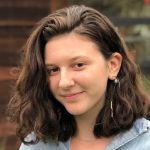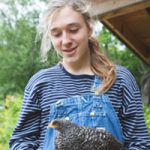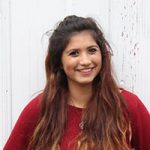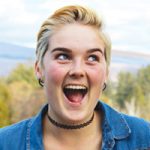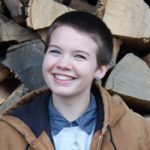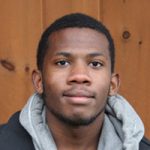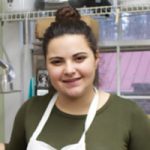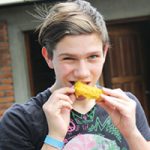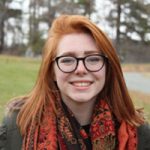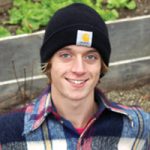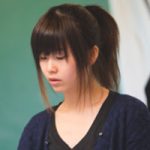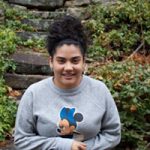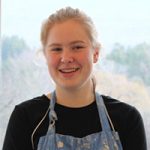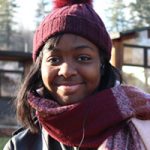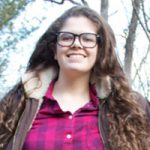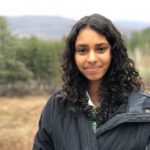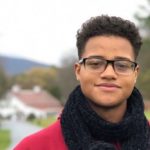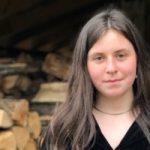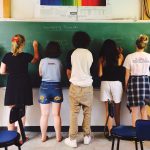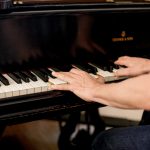Sciences
cience at Buxton is, like all elements of our academic programs, both rigorous and unique. We do offer the standard set of college prep classes: Biology, Chemistry, and Physics, along with a number of other electives. Our science classes teach students to approach the world around them with wonder and rigor and to realize the significance of natural sciences in their own lives.
Through hands-on labs, in-class discussions, field trips, and personal research projects, students get to explore the world around them and to discover for themselves the forces that are at work in our day-to-day lives.
In the fall term biology concentrates on the topics of cell biology and human physiology as an introduction to the fundamentals of the subject. All the systems of the body are discussed and explored, including a detailed section on the brain and nervous system. In the winter term, the focus is on genetics, looking into the workings of DNA and genes, and discussing current issues in genetic technology. In the spring, the main topic is evolution, looked at through the lens of the unique organisms that have evolved in island environments, such as the hotspots of the Galapagos, Hawaii, and Indonesia. All three terms involve weekly labs and several research papers. The spring term includes an independent research project as well, the results of which are presented at the Spring Arts Weekend. Buxton’s extensive campus and greenhouse provide excellent opportunities for many of these labs and projects.
This college-preparatory laboratory science is primarily for juniors and seniors. Topics covered include atomic theory, phase changes, origins and significance of the periodic chart, quantum mechanics, chemical reactions, acid-base relationships, oxidation-reduction principles, and an expanded section on organic chemistry. Whenever possible, discussions are geared to helping students gain an understanding of the principles and mechanics of natural phenomena as well as modern technological advances. The laboratory portion of the course has been designed to illustrate chemical principles and to develop the critical thinking and problem-solving skills of the students. This is accomplished by starting with simple questions about chemistry and requiring students to develop the procedure for each laboratory experiment that they perform. As students develop their methods and become familiar with the lab, the questions become progressively more challenging.
This course is designed to prepare students for college-level physics as well as to let them learn and work with the laws of the world around them. The fall term focuses on the fundamentals of Newtonian mechanics, work, pressure and energy. The winter expands the study of motion into centripetal and rotational analysis. The spring term moves on to the properties of waves, including sound, light and optics and concludes with a survey of modern physics: electro-magnetics, relativity, and quantum mechanics. Weekly labs allow students to make direct connections between theory and practice and to develop experimental procedures. Students also complete several independent or joint projects throughout the year with emphasis on exploration and design; the projects may be presented during Spring Arts Weekend. Due to the importance of mathematical descriptions in the course, Algebra II is a prerequisite for physics.
This elective course is made up of two semester-long sections that can be taken either independently or sequentially. Class work includes weekly individual readings of current articles followed by presentations to the rest of the group. This seminar style class requires that everyone be extremely responsible about meeting their individual work expectations. There are several papers assigned throughout the year, usually two in the fall, one in the winter, and two in the spring term. The class will involve some hands-on labs, regular (almost-weekly) evening documentary watching, and then more extensive field work during a trip to Cape Cod in the spring.
- Fall: Oceanography-The fall semester will look at the ocean in depth, using all the various fields of science, from the chemistry of ocean water to the physics of waves. We will discuss the coasts, along with tides, waves, and tsunamis. We will talk about the open ocean along with currents and El Nino weather. We’ll delve into the structures of the ocean basins: the geology of the ocean floor, undersea volcanos and deep sea vents, and the edges of the sea. Along the way we will talk about the variety of ecosystems and environments in the ocean: the deep sea, the polar seas, rocky- and sandy- shores, coral reefs, mangrove swamps, salt marshes, and the surface of the ocean itself.
- Winter/Spring: Marine Biology-In January the course will move into a survey of marine organisms, looking particularly at the adaptations that creatures make for life in the oceans. It will start with the very small – the viruses and bacteria present in the seas, and move on through the invertebrates to the marine vertebrates – fish, sea turtles, seabirds, and marine mammals. We will focus on animal adaptations and behaviors, and end with a special concentration on the cetaceans (whales and dolphins). Along the way many of the topics will address various environmental issues and discuss human use and development of the ocean’s resources.
In this class, students will learn skills to navigate the outdoors, spend time hiking, as well as delve into topics such as foraging, forest ecology, indigenous history, decolonizing and queering nature, and environmental justice. With a focus on experiential education, classes will mostly take place outside, exploring local trails around campus. By the end of the term, students will know how to set up a tent, cook food outside, pack a backpacking pack, build shelters, treat water, identify plants, and more. Each class will go on an overnight camping trip in New England, where they will summit a local mountain. Students in this class should be prepared to be outside in all weather, engage in moderate hiking, read texts by authors such as Robin Wall Kimmerer, and be in community with each other. We expect the class to be a semester course that will run each semester, once in the fall, and once in the spring. It will likely meet one day a week, after the academic day, during the afternoon time between lunch and dinner. It will be capped at 10 people.
This course provides a layperson’s overview of how to plan for and feed large groups in a commercial kitchen. Every Saturday the class prepares a well thought out and planned menu for at least one of the meals for the entire school, exploring different cuisines and techniques. The school day classroom portion touches on food safety and sanitation, as well as purchasing, menu-planning, and culinary math.
This class will explore health, wellness, and adolescent development. Throughout the semester, we will spend time learning about different aspects of health, as well as how physical, mental, sexual, and social health all interact and affect each other. This class will take an interdisciplinary approach, encouraging students to view their personal health through a social justice lens that accounts for current and historical public health issues. Students should expect a lot of in-class discussions, as well as engaging assignments in the form of readings, podcasts, videos, interviews, self-reflections, and projects rooted in peer-education.
This will be a year long elective in which we start from the basics of writing code and programming principles, and build to much more complex projects. We will learn the control structures and patterns that are core to any computer language, and then implement them in a variety of ways. We will also learn about graphics control in Python with some simple graphic modules. While the language of choice will (most likely) be Python, these principles will apply to a wide array of languages that you may encounter in the future. As well, we will dedicate some time to the history of computer science and the fundamentals underlying hardware, software, and interfaces as well as some popular topics like encryption and cryptocurrencies. This course is appropriate for any student who likes getting immediate feedback from their work, is willing to do some math and calculation to make things come out neatly, and is not scared of learning by doing. There will be no tests or textbooks, though there will be numerous projects and short assignments. Once the first term is over, we’ll decide as a class where to focus – making games, data analysis, algorithms, or something else.

